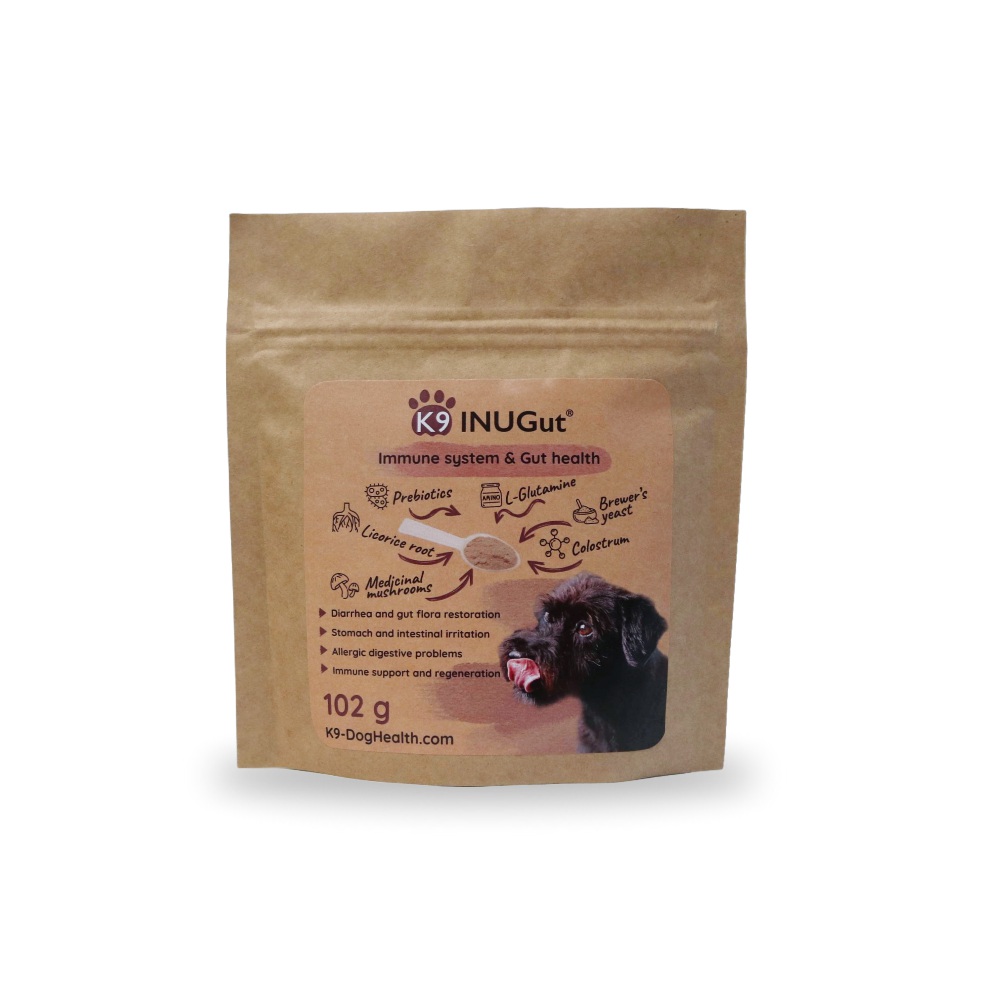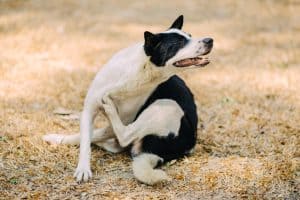Restoring dog gut health – Why it is important
Restoring dog gut health can matter in many everyday situations. Your dog’s microbiome (gut bacteria) may take a hit after antibiotic treatment, but it can also shift after chronic diarrhea, infections, parasites, sudden diet changes, stress, or aging. When that happens, beneficial bacteria can drop, dog digestion may become unstable, and the immune system can weaken too.

Antibiotics are one of the most common reasons for a gut imbalance. They can save lives, yet they can also wipe out helpful bacteria along with harmful germs. That can lead to dysbiosis, which may trigger digestive upset, inflammation, and recurring diarrhea.
What can happen in the microbiome?
When the gut microbiome loses balance, digestion often suffers. Antibiotics can reduce both harmful and helpful bacteria, and infections, parasites, or sudden diet changes can do the same. The body may produce fewer short-chain fatty acids (SCFAs), which normally fuel intestinal cells. Then the gut barrier can weaken, and allergens or pathogens may pass through more easily. In simple terms, SCFAs act like small energy packs for gut cells – when there are fewer of them, the gut lining becomes less resilient. As a result, dogs may develop diarrhea, bloating, recurring gut irritation, or food sensitivity.

When is gut health restoration needed in dogs?
- After antibiotic treatment – the most common reason for major microbiome disruption.
- During chronic or recurring diarrhea – whether it starts with infection or food intolerance.
- After sudden diet changes – the microbiome needs time to adapt.
- During stress or environmental change – traveling, moving, or boarding can strain dog gut health.
- After parasitic infection – Giardia or other parasites can irritate the gut and shift gut bacteria.
- In cases of food allergy and autoimmune conditions – a stressed gut barrier can make symptoms harder to manage.
- In older dogs – the dog microbiome can become less diverse with age, and digestion may become more sensitive.
Types of antibiotics and their effects
Broad-spectrum antibiotics, such as metronidazole or amoxicillin, affect many bacterial groups. Because of that, they often disrupt the gut microbiome more strongly. Narrow-spectrum antibiotics act more selectively, but long courses can still disturb gut balance. Also, the longer the treatment lasts, the longer recovery may take.
Side effects to watch for
- Diarrhea: the most common warning sign.
- Loss of appetite and lethargy: gut upset can affect overall well-being.
- Vomiting: a sign of irritation in the digestive tract.
- Ongoing unstable digestion: dysbiosis can slow down recovery.
Long-term consequences if the microbiome does not recover
- Chronic digestive problems: recurring diarrhea, bloating, and food sensitivity.
- Weakened immune defense: some dogs may get sick more often.
- Allergic and autoimmune flare-ups: a stressed gut barrier may amplify inflammation.
- Age-related sensitivity: the microbiome may recover more slowly, so digestive issues can become more frequent.
What does science say?
Several studies suggest that probiotics can support microbiome recovery after antibiotics (D’Angelo, 2018). Research also suggests that Saccharomyces cerevisiae yeast may help stabilize the gut and support a calmer gut environment (Frontiers in Veterinary Science, 2025). In addition, synbiotics (prebiotics plus probiotics) can offer a practical advantage, because they support both the incoming microbes and the food they need.
The role of prevention
Even though restoring dog gut health matters, prevention matters even more. Overuse of antibiotics is a common issue. Sometimes dogs receive antibiotics when mild digestive problems could improve with simpler steps.
Short-term diarrhea, for example, often improves with a bland diet, steady hydration, and prebiotics and probiotics. In these cases, owners can help protect the microbiome and reduce the chance of bigger setbacks.
Prevention also means avoiding sudden diet switches, because the dog microbiome needs time to adjust. Introduce new food gradually, and include fiber and quality protein to support beneficial gut microbes.
Reducing stress helps too. Travel, moving, and major routine changes can all affect dog gut health. A stable daily rhythm can be as helpful as many add-ons.
When you support digestion early and keep routines steady, you can often prevent more serious microbiome disruption. That protects your dog, and it can also save time, worry, and cost in the long run.
Practical steps for home support
- Bland diet: boiled rice and lean chicken in small portions, then a gradual return to normal food.
- Probiotics: choose a product made for dogs, and use a consistent routine. Natural options like fermented vegetables can also provide live cultures, but start slowly and watch stool changes.
- Prebiotics: soluble fibers (for example, FOS and inulin) that feed beneficial microbes.
- Gut-lining nutrients: L-glutamine, colostrum, medicinal mushrooms, or DGL can support the gut lining.
- Hydration: provide fresh water at all times, and consider electrolytes if your vet recommends them.
The role of diet
Diet shapes gut balance every day. Omega-3 fatty acids (for example, krill oil) can support a healthy inflammatory response. At the same time, quality protein supports tissue repair, while soluble fiber feeds beneficial microbes. When you keep diet consistent and balanced, you support dog intestinal health more effectively.
Microbiome and immune system connection
The microbiome and the immune system influence each other closely. When gut balance shifts, dogs may not only develop digestive issues, but they may also feel more vulnerable overall. That is why supporting dog gut health matters during antibiotics, after illness, and during stressful periods.
Scientific outlook
Microbiome research is a fast-growing area in veterinary medicine. Researchers are paying more attention to fecal microbiota transplantation (FMT), which aims to reset gut balance directly. In simple terms, vets transfer microbes from a healthy donor dog to a dog with severe imbalance. This method is still specialized and not routine for every case, but it shows how central the microbiome is for canine health.
Summary
Restoring dog gut health is useful after antibiotics, and it can also help when gut balance shifts due to infection, parasites, stress, diet changes, or aging. The most stable results often come from a clear plan – probiotics, prebiotics, gut-lining support, and a diet that reduces gut stress. Click here to read about kutya bélflóra in Hungarian.
If you found this guide on dog gut health helpful, you may also want to explore our related articles. Learn how to manage dog diarrhea, and read about dog allergies. For extra support, see our tips on supporting the dog immune system and our guide to dog dementia. If your dog faces bigger health challenges, you can also read our guide on diet for dogs with cancer. Finally, explore how brewer’s yeast for dogs may support digestion, and learn more about mushroom supplement production.
Frequently asked questions about restoring dog gut health
❓ How long does it take to restore dog gut health after antibiotics?
This varies from dog to dog. In mild cases, digestion may stabilize within 1-2 weeks. After broad-spectrum antibiotics, longer treatment courses, or recurring diarrhea, full gut balance may take 4-8 weeks. A gradual diet, targeted prebiotics and probiotics, and gut-lining support can speed up recovery.
❓ What are the most common signs of gut imbalance in dogs?
Common signs include diarrhea, bloating, louder gut sounds, mucus in the stool, frequent gas, and appetite changes. Dogs may also seem tired or uncomfortable. If symptoms last longer than 2-3 days, or if blood, fever, or vomiting appears, consult your veterinarian.
❓ When should I give probiotics – during or after antibiotics?
In many cases, probiotics can help during antibiotic treatment, but timing matters. A common approach is to give probiotics 2-3 hours after the antibiotic dose. After finishing antibiotics, continue probiotics for at least 2-4 weeks to support gut recovery.
❓ What is the difference between probiotics, prebiotics, and synbiotics?
Probiotics contain live beneficial bacteria or yeast. Prebiotics are soluble fibers that feed those microbes. Synbiotics combine both. For many dogs, synbiotics can be a practical option because they support both intake and growth of beneficial microbes.
❓ Can I give human probiotics to my dog?
This is usually not ideal. Human probiotics often use strains that are less suitable for dogs, and some products include additives that may irritate sensitive digestion. Dog-specific probiotics are often a safer fit.
❓ What should I do if my dog develops diarrhea after antibiotics?
Offer a bland diet with small portions of easily digestible protein and carbohydrates, ensure good hydration, and support gut balance with prebiotics and probiotics. If diarrhea is severe, watery, bloody, paired with vomiting or lethargy, or does not improve within 24-48 hours, contact your veterinarian.
❓ When should I consult a veterinarian for gut health problems?
Seek veterinary help right away if you notice blood in the stool, strong vomiting, lethargy, fever, refusal to drink, or diarrhea lasting more than 2 days. In puppies, senior dogs, or dogs with chronic conditions, even mild symptoms may need earlier support.
Sources:
- D’Angelo S. et al. – Effect of Saccharomyces boulardii in dogs with chronic enteropathy, 2018, Veterinary Record.
- Arghavani A. et al. – Saccharomyces cerevisiae supplementation alleviates antibiotics-induced gut dysbiosis, 2025, Frontiers in Veterinary Science.
- Guard B.C. et al. – The dog microbiome: balancing health and disease, 2019, Frontiers in Veterinary Science.
- Stübing S. et al. – Synbiotic vs. Metronidazole in canine chronic enteropathy, 2024, Veterinary Sciences.




